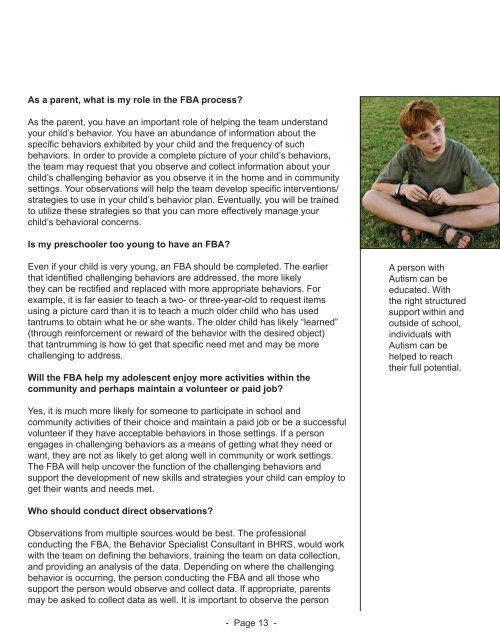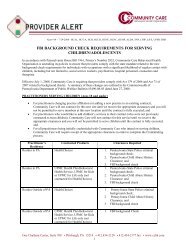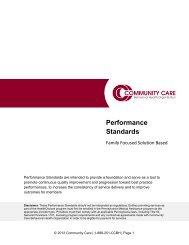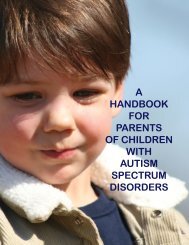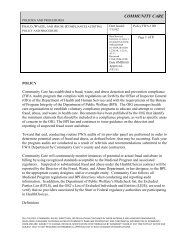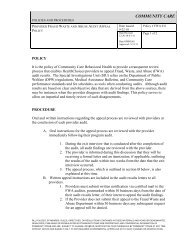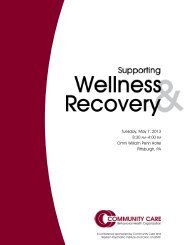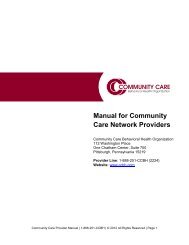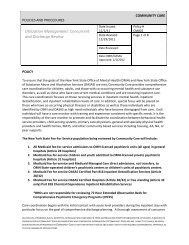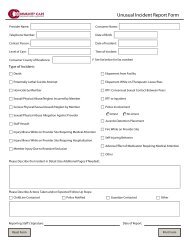a handbook for parents of children with autism spectrum disorders
a handbook for parents of children with autism spectrum disorders
a handbook for parents of children with autism spectrum disorders
You also want an ePaper? Increase the reach of your titles
YUMPU automatically turns print PDFs into web optimized ePapers that Google loves.
As a parent, what is my role in the FBA process?<br />
As the parent, you have an important role <strong>of</strong> helping the team understand<br />
your child’s behavior. You have an abundance <strong>of</strong> in<strong>for</strong>mation about the<br />
specific behaviors exhibited by your child and the frequency <strong>of</strong> such<br />
behaviors. In order to provide a complete picture <strong>of</strong> your child’s behaviors,<br />
the team may request that you observe and collect in<strong>for</strong>mation about your<br />
child’s challenging behavior as you observe it in the home and in community<br />
settings. Your observations will help the team develop specific interventions/<br />
strategies to use in your child’s behavior plan. Eventually, you will be trained<br />
to utilize these strategies so that you can more effectively manage your<br />
child’s behavioral concerns.<br />
Is my preschooler too young to have an FBA?<br />
Even if your child is very young, an FBA should be completed. The earlier<br />
that identified challenging behaviors are addressed, the more likely<br />
they can be rectified and replaced <strong>with</strong> more appropriate behaviors. For<br />
example, it is far easier to teach a two- or three-year-old to request items<br />
using a picture card than it is to teach a much older child who has used<br />
tantrums to obtain what he or she wants. The older child has likely “learned”<br />
(through rein<strong>for</strong>cement or reward <strong>of</strong> the behavior <strong>with</strong> the desired object)<br />
that tantrumming is how to get that specific need met and may be more<br />
challenging to address.<br />
Will the FBA help my adolescent enjoy more activities <strong>with</strong>in the<br />
community and perhaps maintain a volunteer or paid job?<br />
A person <strong>with</strong><br />
Autism can be<br />
educated. With<br />
the right structured<br />
support <strong>with</strong>in and<br />
outside <strong>of</strong> school,<br />
individuals <strong>with</strong><br />
Autism can be<br />
helped to reach<br />
their full potential.<br />
Yes, it is much more likely <strong>for</strong> someone to participate in school and<br />
community activities <strong>of</strong> their choice and maintain a paid job or be a successful<br />
volunteer if they have acceptable behaviors in those settings. If a person<br />
engages in challenging behaviors as a means <strong>of</strong> getting what they need or<br />
want, they are not as likely to get along well in community or work settings.<br />
The FBA will help uncover the function <strong>of</strong> the challenging behaviors and<br />
support the development <strong>of</strong> new skills and strategies your child can employ to<br />
get their wants and needs met.<br />
Who should conduct direct observations?<br />
Observations from multiple sources would be best. The pr<strong>of</strong>essional<br />
conducting the FBA, the Behavior Specialist Consultant in BHRS, would work<br />
<strong>with</strong> the team on defining the behaviors, training the team on data collection,<br />
and providing an analysis <strong>of</strong> the data. Depending on where the challenging<br />
behavior is occurring, the person conducting the FBA and all those who<br />
support the person would observe and collect data. If appropriate, <strong>parents</strong><br />
may be asked to collect data as well. It is important to observe the person<br />
- Page 13 -


